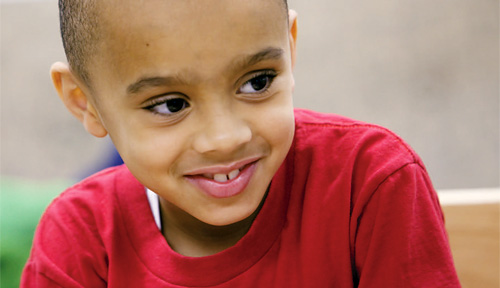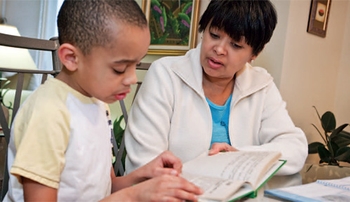Nine-year-old Noah Legros sits on one foot and deals out UNO cards to a group of four boys around the table. But this isn’t your average after-school gathering. The participants in the group have all been diagnosed with high-functioning autism, Asperger’s disorder or ADHD. Noah is in social skills class at UNMC’s Munroe-Meyer Institute (MMI).

|
| Noah Legros as made great progress in an after-school program designed to teach social skills to children with high-functioning autism, Asperger’s disorder or ADHD. |
For Noah, communicating and socializing with other children doesn’t come naturally. While he’s outgoing and articulate, if a peer were to accidentally drop a book on the ground, offering to pick it up doesn’t occur to him.
That’s why psychologist Terri Mathews, Ph.D., and her team teach skills like “Offering Help” along with “Sharing ideas,” “Complimenting others,” “Recommending changes nicely,” and “Exercising self-control.” Together, they are the S.C.O.R.E skills.
“What’s a compliment you could give to Aiden?” Dr. Mathews asked Noah at a recent session.
“Very nice job on UNO, Aiden,” Noah replied.
When they practiced sharing ideas, Noah approached Isaac and said, “Hey, let’s play Cars II on the Wii!” Isaac asked if he wanted to jump on the trampoline. Noah kept eye contact and responded, “Sure, that sounds nice.”
“He’s very social,” said Noah’s mother, Tatiana, “but he needs helps with what to say and what not to say. He can talk about trucks for one hour. After five minutes, most people want to change topics and talk about the weather.”
Special interests are a frequent issue for children with autism, Dr. Mathews said.
“Most children without autism pick up on what is expected of them socially,” she said. “They understand etiquette through modeling or observing. Children who have autism don’t seem to have the same innate ability to recognize what is expected in social situations.”
Yet it is possible for them to acquire those skills. Repetition is key. The classes are just the tip of the iceberg, Dr. Mathews said.

|
| The parent component of the social skills classes helped Noah’s mother, Tatiana, better understand why her son needs help exercising self control. Here, he reads out loud from his homework. |
“We spend eight, 1 ½-hour sessions learning about social skills, so we’re only able to cover the basics,” she said. “We want parents to take their children out in the community and find opportunities to practice the skills.”
After initially only offering the classes for children, Dr. Mathews added an educational parent training component so that parents could learn what the children were learning.
She hopes it helps the skills transfer to the home environment. Doing the skills naturally – without prompts from parents – has proven difficult for the participants. However, the parent component did help Tatiana Legros to better understand her son.
“I realized a lot of what he does comes with who he is,” she said. “Now I have a clear idea of what to expect going forward. Social skills are not easy or automatic for him. I might have to say something 20 times, but we’ll keep trying.”
Noah has shown the most progress with the E in S.C.O.R.E., Exercising self-control.
“He always was pleasant, but he also was sort of a “rule cop,” Dr. Mathews said. “Since the program started, he’s learned to restrain himself, allow others to speak and not dominate the conversation.”
His mother and father want what all parents want for their children: friends. Interacting with peers may not be a high-priority now, but as children with autism spectrum disorders become teenagers they begin to recognize that they don’t always fit in and they don’t know why. This can lead to loneliness. That’s when deficits in social skills become more of a detriment, Dr. Mathews said.
Her hope is that the participants in the social skills program will succeed in group settings.
“I want them to be invited to birthday parties, to invite friends over and to have someone to sit with them at the lunch table” she said.
Hopefully someday, Noah will host your average after-school gathering with four boys he can call his friends.